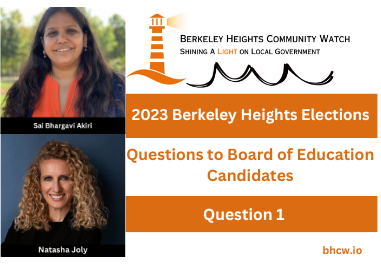The current majority can embrace the benefits of a split Board instead of working feverishly to maintain control.
During a recent Berkeley Heights Board of Education meeting, board member Robert Cianciulli appeared rather concerned about having a “4-4 board”. The implication here is that board members would no longer vote in a bloc, but would instead have differing opinions that would either require compromise or result in no action being taken. What is a concern for the current majority actually has the potential to be of great benefit to our schools, and therefore our kids. In order to see how, we need to look first at what role a board of education plays.
According to the New Jersey School Board Association (NJSBA) “The school board has a dual role: To represent the concerns of the citizens, taxpayers and parents to the school administrators, and to represent the needs of the students and school district to the citizens, taxpayers and parents of the community. The school board does not operate the district on a day-to-day basis; that is the job of the superintendent, who is the district’s chief executive. Rather, the school board sets the policies, goals and objectives for the district – and it holds the superintendent responsible for implementing the policies and achieving the goals.”
Right off the bat, it has been quite apparent for the last few years that ‘concerns of the citizens’ have not been a priority. We see this through a refusal to allow Zoom participation, strict adherence to time limits, no back-and-forth interaction and little to no response to questions asked at meetings or to emails. While representing the needs of the schools to the public may have a slightly better response from our board, they have their own determination of what those needs are, and they are not necessarily in tune with what district teachers and residents might think the schools need.
On the topic of ‘sets policies’, yes, we see that the board is quite eager to take on that role – especially when they can set policies that limit those board members who disagree with the majority, limit resident input, and even define which groups in town are to be considered non-partisan. When faced with policy suggestions with which the majority doesn’t like, the response is to fall back on the NJSBA as an authority, despite the fact that they are a guiding organization and do not dictate what a school board must do.
And the last part of this: holding the superintendent responsible. The goals presented to the public by the board/superintendent are shown to us by slide presentations that are limited in detail. This, by itself, is not a criticism. Meetings are long enough without scrutinizing every detail and action plan of a goal. However, it would be a challenge (if not impossible) for a board member to follow the exact implementation of all goals. Like the rest of us, they must rely in large part on what the superintendent reports. This is where we are lacking. The superintendent has not publicly responded to questions about a decline in proficiencies, other than to say that we have our own internal measurements, we have great AP students, we have National Merit Scholars, and we went through Covid. We have seen presentations of state data from our building principals, but which compare us to the state as a whole rather than similar districts. For over a year, the DEI page of our website was blank, despite our spending on Marc Strachan’s presentation. The discussions surrounding the superintendent’s performance are held in executive session, where the public has no visibility.
For all these reasons, having a “4-4 board” can only help, as it means the board will have to be more accountable itself, will have to answer to a wider range of concerns and perspectives, and will have to justify decisions.
I’ll be writing follow-up articles about specific upcoming issues that will be determined by our new board, as well as actions taken by the current board in an attempt to set the stage before the new “4-4 board” becomes effective in January. Teaser… there is at least one major concern with regards to this, and it is one where the board may be violating policy in those attempts.



